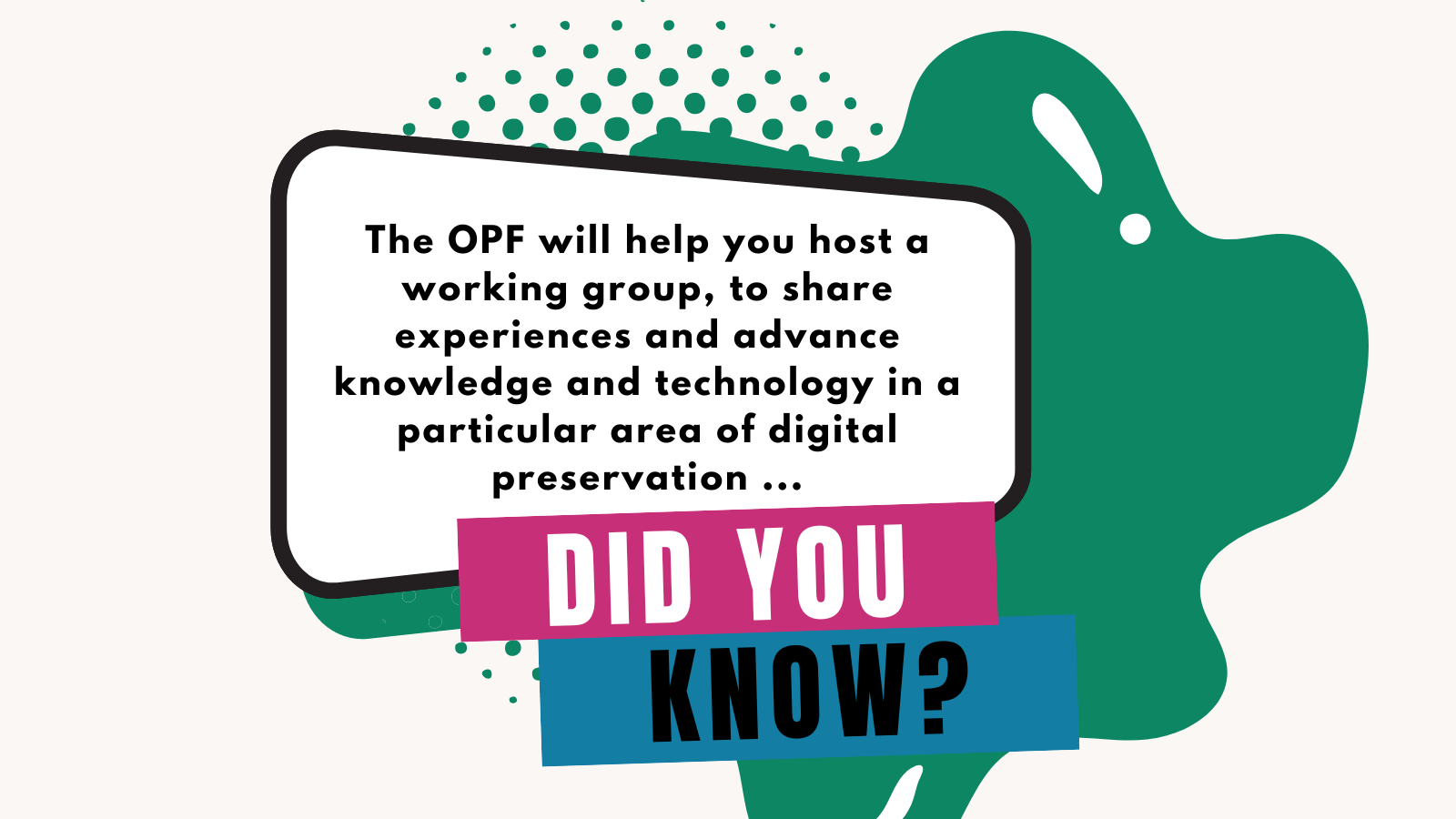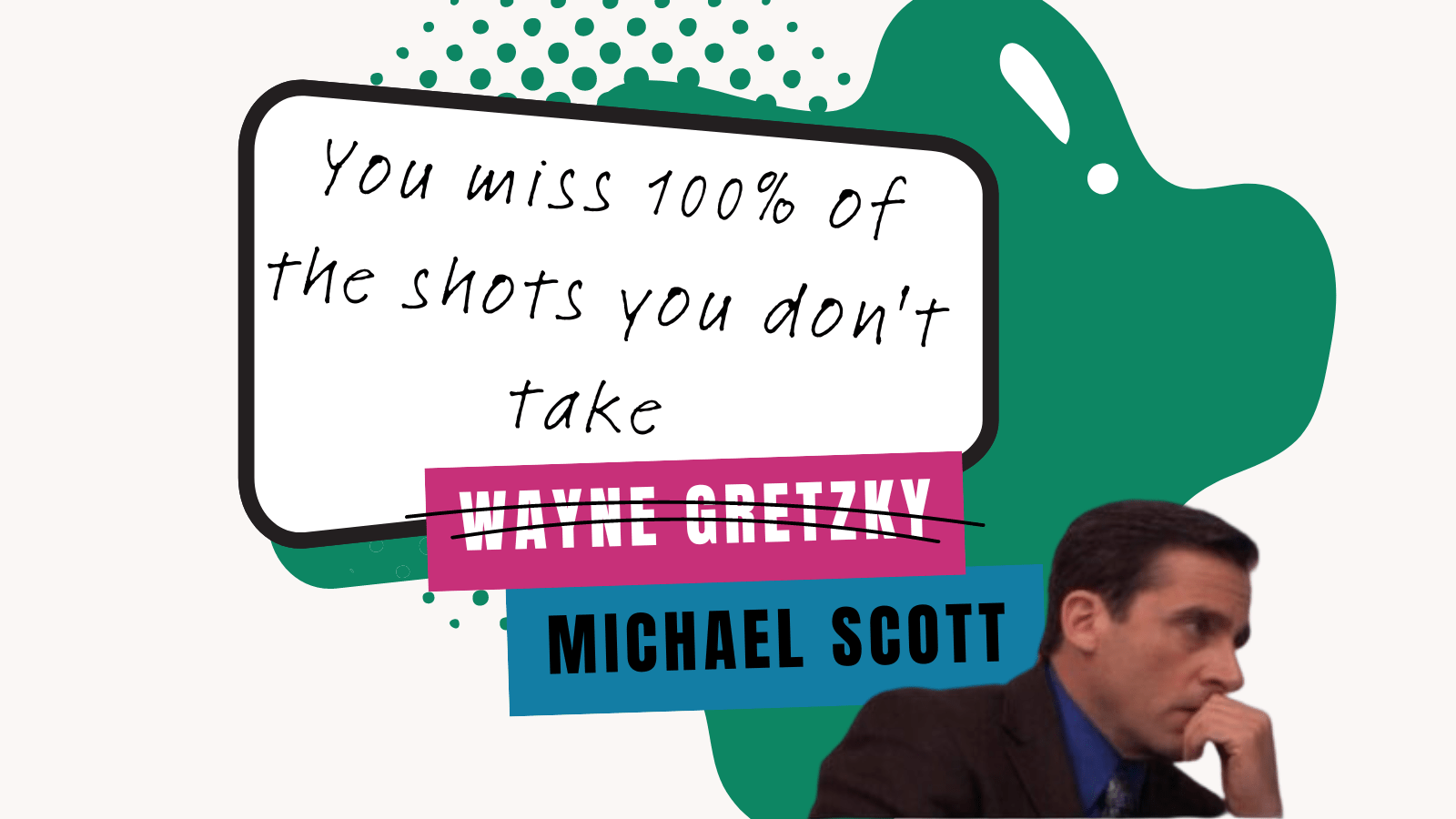There are numerous benefits to a working group, ‘an organisational special interest group’, a ‘community-driven exercise in team work’ – however you think they are best described.

At OPF, the purpose of these groups is to facilitate communication and collaboration on a specific digital preservation theme or topic. The topics are selected by our members, and the groups are ideally then led by a member organisation. We want to host more of these, to facilitate discussion and help develop and establish the best open source community possible.
The interest groups will bring together members with common interests and expertise to share experiences and advance knowledge and technology in a particular area of digital preservation. By bringing participants together, we aim to reduce the duplication of effort and create hubs of information on specific topics. Where appropriate, participation can be made available to the wider community with agreement from the group.

But what about collaboration?
All organisations value group work, but a collaborative, multi-institutional group is often valued more. The advancement of learning is a big and enjoyable part of the digital preservation sector. In this light, the benefits of a working group lie largely in the collaborative engagement of those interested, who all have complementary skills to contribute.
At the OPF, we strive to create opportunities for the dissemination of ideas, insights and best practices between our members. We do this through the member groups that we host. These provide a space to connect with like-minded practitioners and share experience, challenges and expertise in specialist areas. Each group has identified initial aims, specific to their area of interest.
In the past, examples of aims or tasks for interest groups have been:
- to gather requirements for tool development, to create a software prototype,
- to evaluate available tools for certain content types,
- to curate the existing information on the OPF wiki and reference other community sources,
- to build a knowledge base or forum, to collaborate on a report or case study,
- to publish case studies through the OPF blog,
- to commission webinars,
- or to steer the focus and agenda of a face to face event.
So, what are the benefits?
There are a multitude of reasons to contribute and offer your support. Apart from being able to share your own experience and knowledge, there are many skills to learn that are essential for both professional and personal success. One of the foundational elements of effective group work, for instance, is strong communication skills. They are crucial for transferring ideas and concepts. In such an environment, people are better able to listen, solve problems, build trust, and handle conflict. In these scenarios, the OPF have seen that developing and sharing in a global, collaborative and communicative environment has led to work being completed to a unified standard, improved performance in a specific area, and improved accuracy, delegation and leadership skills. As stated on opensource.com,
“Open source projects, products, or initiatives embrace and celebrate principles of open exchange, collaborative participation, rapid prototyping, transparency, meritocracy, and community-oriented development.”

An interest group offers a supportive team environment in which to build new networks and knowledge. Notably, collaborative working increases productivity. Statistics show that 86% of employees and leaders lack the skills to communicate effectively and cite this as the primary reason for workplace failures. Forbes also stated in 2017, that employees engaged in group tasks are likely to stick to their tasks 64% longer than their peers who aren’t familiar with the structures and pace of group work. They also reported higher engagement levels, lower weariness and greater success rates. Furthermore, this effect lasted for weeks.
A task is frequently accomplished more quickly and to a higher standard when the duties are shared. Most importantly in this situation, everyone should be aware of their strengths and weaknesses. Clear communication can be used to decide on who should do what task, and who wishes to join in on what. This means that people aren’t doing tasks they don’t enjoy, and are completing tasks they feel are more suited to them. We have seen that shared responsibility helps people feel more confident about their ability to complete a task, and encouragement in a team environment boosts motivation, enthusiasm and productivity.
For those with an ongoing problem that the community could help to solve, a special interest group could be the answer. A teamwork environment is the best for exchanging ideas, coming up with fresh concepts, and coming up with practical answers to continuing issues. These hybrid solutions can be used to solve greater problems that we experience in the global community. After all, open source is all about finding new results, and new approaches to cost-saving benefits for organisations to deliver higher levels of care and development.
The perspective or opinion of the individual is one of the main obstacles to resolving conflict within an environment, whether it be at a singular institution or over a larger community issue. Often, open source is considered to benefit only developers, but this isn’t the case. Our community is expanding and more often than not people are relying on digital preservation – whether they realise it or not. A working group encourages you to expand your working environment and can give you a larger, more dedicated pool to find alternative solutions and new vocabularies. In developing new perspectives it is easier to relate to new problems and anticipate new ones.


Solutions that are difficult to arrive at are encouraged by the chance to combine ideas, experiences, and abilities to create a special dynamic. However, team members must feel at ease in their surroundings and seek out opportunities for open communication for this to be successful. At the OPF, we’ll be there to support you on your journey to find solutions.
We will support the administration of the interest groups by arranging calls, providing use of our meeting and webinar tools, managing users and permissions on the website, hosting the group’s tools, and uploading content for publication internally or externally.
Interest groups may also request other support from OPF staff as the requests relate to our strategic objectives of supporting technology, knowledge, advocacy and alliances. Small requests can be dealt with quickly while larger requests may need to feed into the annual planning cycle and be scheduled alongside other priorities.
Technology
We will provide technical support and guidance to our interest groups. This might be to provide administrative support setting up and administering GitHub projects or help with reporting and replicating software bugs. We can help to improve the quality and reliability of any software judged as valuable by an interest group. This might be achieved by working with a group to create test corpora and set up automated testing and reporting for a project. Alternatively we could help to produce an installable package for a particular platform in response to a group request. An interest group may also publish a roadmap for a software project and we can help with prioritising requirements and coordinating shared development effort.
Knowledge exchange
We will provide platforms and support for interest groups, including website content to aid promotion of the group and discoverability of information sources, a wiki space for collaborative work, and mailing lists to aid group communication. Interest groups may also choose to commission webinars from the community-at-large, organise face-to-face events, or publish a series of blog posts. We will provide support to each of these initiatives as appropriate.
Website
The OPF website will provide a high level overview of the purpose of the interest groups and will be the home for final versions of publications which will be available to OPF members as member content. We will help promote new content and raise awareness of the group as appropriate through our internal and external communications channels including our website, members email list, community email list and posting to external mailing lists, LinkedIn groups, Twitter etc.
Mailing lists + Slack
Dedicated mailing lists will be available upon request which can be used for interest group communications, and will also be used for technical support for tools. Each interest group can also have a slack channel for communications.
Advocacy and Alliances
We can make introductions or approach external experts to join or participate in the group activities. This can include commissioning webinars, collaborating on reports, and peer reviews. Group leaders can invite external participants with relevant expertise, but it must be subject to agreement from the interest group.
We are all (mostly) sociable by nature, and enjoy feeling like we belong to a group. Dominantly, the digital preservation community operates online. The isolation that follows could have a negative impact on our motivation and productivity. We are here to help you combat this, as both personal and business improvements are visible when engaging in group work. It’s proven that we are more productive and happier when working with others. We all want to see growth and innovation!

All OPF members are welcome to join an interest group at any time. Our members can request new groups, lead new groups and help prioritise the aims, tasks and requirements. Members also receive early access to reports, case studies and other outputs from the groups.
Where appropriate, groups can be made available to the wider community. External participants from the digital preservation community can be invited to join where their involvement brings a clear benefit, subject to agreement from the group. If you’re not a member and you wish to start a group, just reach out! On the condition that a member is a co-chair and enough of our members want to be involved and endorse your idea, we will happily run it also.
How do you join an interest group?
Please get in touch with the chair of the group (named on our website) or email georgia@openpreservation.org with any questions.
By joining an interest group you commit to:
- Respect the other members of the group;
- Share expertise and effort;
- Engage with the group to ensure the aims are understood and fulfilled;
- Attend calls and respond to communication from the group;
- Encourage participation and contributions.
If you wish to form an interest group on a new topic, please get in touch. To recap: interest groups bring together members of the community with common interests and expertise to share experiences and advance knowledge and technology in a particular area of digital preservation. By bringing participants together, we aim to reduce duplication of effort and create hubs of information on specific topics. To you, personally, your participation in a group leads to new skills, increased productivity, strengthened communication abilities and shared responsibilities. The opportunity to develop new perspectives and relate to new problems encourages innovation. But the opportunity to find new approaches to resolve differences is a positive not to be taken lightly. In a global, multidisciplinary environment that our special interest groups happen to embrace, the possibilities are endless.


